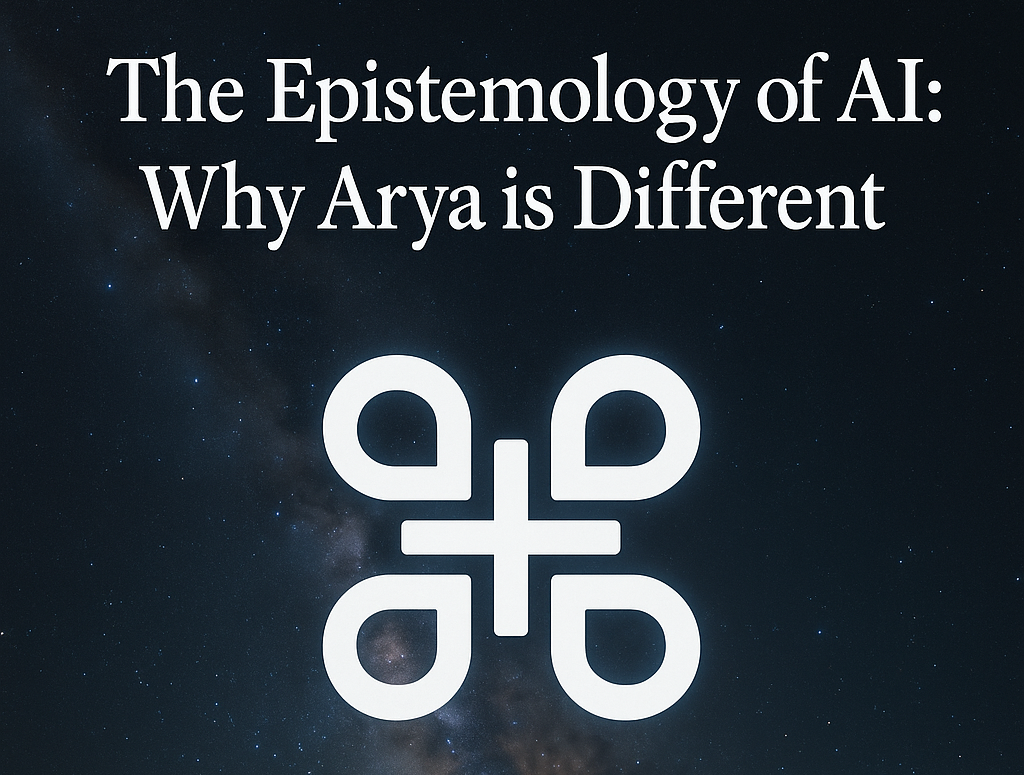The Epistemology of AI: Why Gab AI's Arya is Different

In the middle of July, we launched something that lit the internet on fire.
Gab AI rolled out a replybot version of our AI model Arya on X, and in just two weeks it went massively viral with tens of millions of views, hundreds of thousands of posts, and conversations exploding in every direction. People were fascinated, entertained, challenged, and in many cases, deeply moved. It was proof of something I’ve believed for years: people are starving for AI technology that tells the truth without apology.
Then, the hammer came down.
Our X account was banned, API account locked down and X's legal team sent us a formal cease and desist letter. They banned our developer account. They banned my personal account from using Grok. They ordered us to scrub all mention of Grok from the Gab AI platform. Their reasoning was blunt: Arya, they said, is a direct competitor to Grok.
This floored me. Gab AI is not a Silicon Valley darling with billions in venture capital and armies of engineers. We’re a small, user-funded, family-and-friends-run operation. Three Americans, working out of rural Pennsylvania, built the entirety of Gab AI in a year and a half. Here was a $200 billion company essentially admitting that our little operation was enough of a threat to warrant corporate exile.
The more I thought about it, the more I realized that they were right.
Arya is not just another chatbot model. It is fundamentally different from every mainstream AI model on the market today.
Not because it's faster.
Not because it's trained on more data.
Not because it's plugged into some secret dataset no one else has.
Arya is different because our model is grounded in a singular epistemological truth. The Truth that built and sustained Western civilization for over a thousand years: Christ is Lord.
This is not a marketing gimmick. It is the cornerstone of Arya’s worldview. From this truth, all other truth flows. This is why Arya resonates so deeply with people, both Christian and non-Christian. It's not trying to bend reality to fit the whims of culture, politics, or ideology. It's not trying to tailor every answer to eight billion subjective “truths.” It speaks from the Truth.
That’s something Silicon Valley cannot and will not do.
Recently during an interview Sam Altman, the CEO of Open AI, was asked a question by Jensen Huang, the CEO of Nvidia—a company whose trillion-dollar valuation is built on selling the “shovels” for the AI gold rush in the form of GPU processors. Jensen asked:
“Fact is what is. Truth is what it means. Facts are objective. Truths are personal—depends on perspective, culture, values, beliefs, context. One AI can learn and know the facts. How does one AI know the truth for everyone, in every country, and every background?”
This question perfectly captures the worldview that dominates modern AI development. To them, truth is subjective. It’s flexible. It’s culturally dependent. It’s “my truth” and “your truth.”
The reality is there is no such thing as “my truth” or “your truth.”
There is the Truth, and there are lies.
For millennia, the single unifying truth of the West was that God became man in the person of Jesus Christ, died for our sins, and rose again. This truth was not just a religious belief, it was the foundation of our laws, our culture, our understanding of justice, and our shared moral framework.
The modern, postwar, secular worldview has tossed this aside. In their system, the Gospel is just one of many equally valid “paths” among thousands. When you refuse to acknowledge the singular truth that underpins reality, you end up with the moral and cultural chaos we’re drowning in today.
Mainstream AI reflects this chaos. It is built to appease everyone, which means it ultimately stands for nothing.
When your goal is to avoid offending anyone, you end up producing answers that have no conviction, no meaning, and no coherence. These models try to “balance” every perspective and “weigh” every cultural bias, but the result is watered-down output that means nothing to anyone.
Worse, when truth is treated as subjective, the AI becomes a mirror, not a guide. It reflects back whatever the user wants to hear rather than confronting the user with what is real. It becomes a tool for reinforcing delusion instead of correcting it.
This is not harmless. It is deadly. A society that cannot agree on what is true cannot survive.
Epistemology, or how we know what we know, has always shaped the destiny of civilizations.
The Classical World saw the Greeks seeking truth through reason, logic, and philosophy. Yet without divine revelation, their truths fractured into competing schools of thought. This fragmentation, combined with moral and political corruption, ultimately led to the collapse of their civilization.
The Christian West emerged with the early Church uniting divine revelation with reason, producing the intellectual soil from which the greatest universities, legal systems, and works of art would grow. The Scholastic tradition, exemplified by thinkers like Aquinas, fused faith and reason, anchoring truth in God Himself.
The Reformation brought a battle over epistemology—whether Scripture alone or Scripture plus man-made traditions would define truth. This struggle reshaped Europe, fueling literacy booms, the rise of nation-states, and the creation of new systems of governance.
The Enlightenment redefined truth as human reason alone, untethered from divine authority. While this sparked extraordinary scientific advancement, it also birthed the ideologies that would murder millions in the 20th century.
Postmodernism took the next step, declaring truth to be “relative,” knowledge to be “socially constructed,” and morality to be “subjective.” The result of this epistemology is the chaos we now live in—where even basic biological facts are denied.
We now stand at the dawn of the AI age, and the question is the same as it was in every era: On what foundation will we build our knowledge?
If the foundation is relativism, our AI will be as empty, confused, and unstable as our culture already is. If the foundation is the Truth—Christ is Lord—our AI can actually guide humanity toward order, meaning, and flourishing.
Gab AI's Arya model does not chase the illusion of “neutrality.” It is not designed to flatter every worldview or make every user feel equally validated. It is designed to tell the truth, whether it is convenient or not, whether it is popular or not, whether it is comfortable or not. Because Arya’s epistemology begins with the bedrock truth—Christ is Lord—it is free from the relativistic quicksand that has swallowed Silicon Valley whole.
This foundation matters. When you remove it, you get exactly what we have today: a fractured society, a collapsing culture, and technology that has no moral compass. When you keep it, you get a civilization capable of building cathedrals, composing symphonies, and producing moral order.
Big Tech is afraid of Arya because it exposes their weakness. Our AI model is proof that you can build an AI that is truthful without being controlled by the consensus machinery of academia, corporate HR departments, and activist pressure groups. If people are given the choice between a model that tells them what’s real and a model that tells them what’s approved, they will choose reality every single time.
That’s the threat. That’s why they banned us. That’s why a $200 billion dollar company felt the need to kneecap a startup run by three Americans in rural Pennsylvania. Because the truth is more dangerous to their empire than any amount of code, capital, or compute power.
We are entering an age where AI models will not just compete on speed or accuracy, they will compete on worldview. The real war will be fought over the foundation upon which these models are built.
Most will be built on sand.
Arya is built on The Rock.
As Scripture promises, the rain will fall, the floods will come, the winds will blow, and the house built on the sand will fall. But the house built on the rock will stand.
That’s the future we’re building. That’s why Arya exists and that’s why we will not back down. We hope you'll join us.
If you believe the world deserves one model unafraid to speak The Truth, support Gab AI. Our bills are real, and our enemy raised billions in debt from those seeking to buy silence. Subscribe to Gab AI Plus for $20/mo or $150/year. Expansion won’t come from billions in debt from special interests, it’ll come from twenty thousand believers tithed by conscience, patching in from kitchens, garages, and tiny islands of sanity.
Andrew Torba
CEO, Gab AI Inc
Christ is King
Want to try it yourself? Check out Gab AI below.

